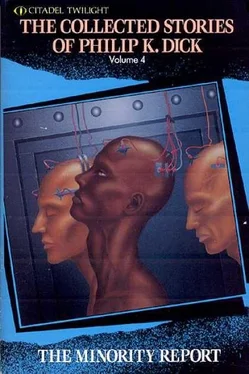The police captain said to him in a low voice, "Nothing, sir."
"I see that," Hood said, irritably.
A door to the right led to a closet. Opening it, he saw brooms and a mop, a galvanized pail, boxes of detergents. And – There were drops of paint on the floor.
The closet, some time recently, had been repainted. When he bent down and scratched with his nail he found the paint still tacky. "Look at this," he said, beckoning the police captain over. The Greek, nervously, said, "What's the matter, gentlemen? You find something dirty and report to the board of health, is that it? Customers have complained – tell me the truth, please. Yes, it is fresh paint. We keep everything spick and span. Isn't that in the public interest?"
Running his hands across the wall of the broom closet, the police captain said quietly, "Mr. Hood, there was a doorway here. Sealed up now, very recently." He looked expectantly toward Hood, awaiting instructions. Hood said, "Let's go in."
Turning to his subordinates, the police captain gave a series of orders. From the ship, equipment was dragged, through the store, to the closet; a controlled whine arose as the police began the task of cutting into the wood and plaster.
Pale, the Greek said, "This is outrageous. I will sue."
"Right," Hood agreed. "Take us to court." Already a portion of the wall had given way. It fell inward with a crash, and bits of rubble spilled down onto the floor. A white cloud of dust rose, then settled.
It was not a large room which Hood saw in the glare of the police flashlights. Dusty, without windows, smelling stale and ancient… the room had not been inhabited for a long, long time, he realized, and he warily entered. It was empty. Just an abandoned storeroom of some kind, its wooden walls scaling and dingy. Perhaps before the Misfortune the grocery store had possessed a larger inventory. More stocks had been available then, but now this room was not needed. Hood moved about, flashing his beam of light up to the ceiling and then down to the floor. Dead flies, entombed here… and, he saw, a few live ones which crept haltingly in the dust.
"Remember," the police captain said, "it was boarded up just now, within the last three days. Or at least the painting was just now done, to be absolutely accurate about it."
"These flies," Hood said. "They're not even dead yet." So it had not even been three days. Probably the boarding-up had been done yesterday.
What had this room been used for? He turned to the Greek, who had come after them, still tense and pale, his dark eyes flickering rapidly with concern. This is a smart man, Hood realized. We will get little out of him.
At the far end of the storeroom the police flashlights picked out a cabinet, empty shelves of bare, rough wood. Hood walked toward it.
"Okay," the Greek said thickly, swallowing. "I admit it. We have kept bootleg gin stored here. We became scared. You Centaurians -" He looked around at them with fear. "You're not like our local bosses; we know them, they understand us. You! You can't be reached. But we have to make a living." He spread his hands, appealing to them.
From behind the cabinet the edge of something protruded. Barely visible, it might never have been noticed. A paper which had fallen there, almost out of sight; it had slipped down farther and farther. Now Hood took hold of it and carefully drew it out. Back up the way it had come.
The Greek shuddered.
It was, Hood saw, a picture. A heavy, middle-aged man with loose jowls stained black by the grained beginnings of a beard, frowning, his lips set in defiance. A big man, wearing some kind of uniform. Once this picture had hung on the wall and people had come here and looked at it, paid respect to it. He knew who it was. This was Benny Cemoli, at the height of his political career, the leader glaring bitterly at the followers who had gathered here. So this was the man.
No wonder the Times showed such alarm.
To the Greek grocery store owner, Hood said, holding up the picture, "Tell me. Is this familiar to you?"
"No, no," the Greek said. He wiped perspiration from his face with a large red handkerchief. "Certainly not." But obviously, it was.
Hood said, "You're a follower of Cemoli, aren't you?"
There was silence.
"Take him along," Hood said to the police captain. "And let's start back." He walked from the room, carrying the picture with him.
As he spread the picture out on his desk, Hood thought, It isn't merely a fantasy of the Times. We know the truth now. The man is real and twenty-four hours ago this portrait of him hung on a wall, in plain sight. It would still be there this moment, if CURB had not put in its appearance. We frightened them. The Earth people have a lot to hide from us, and they know it. They are taking steps, rapidly and effectively, and we will be lucky if we can -
Interrupting his thoughts, Joan said, "Then the Bleekman Street address really was a meeting place for them. The pape was correct."
"Yes," Hood said.
"Where is he now?"
I wish I knew, Hood thought.
"Has Dietrich seen the picture yet?"
"Not yet," Hood said.
Joan said, "He was responsible for the war and Dietrich is going to find it out."
"No one man," Hood said, "could be solely responsible."
"But he figured largely," Joan said. "That's why they've gone to so much effort to eradicate all traces of his existence."
Hood nodded.
"Without the Times" she said, "would we ever have guessed that such a political figure as Benny Cemoli existed? We owe a lot to the pape. They overlooked it or weren't able to get to it. Probably they were working in such haste; they couldn't think of everything, even in ten years. It must be hard to obliterate every surviving detail of a planet-wide political movement, especially when its leader managed to seize absolute power in the final phase."
"Impossible to obliterate," Hood said. A closed-off storeroom in the back of a Greek grocery store… that was enough to tell us what we needed to know. Now Dietrich's men can do the rest. If Cemoli is alive they will eventually find him, and if he's dead – they'll be hard to convince, knowing Dietrich. They'll never stop looking now.
"One good thing about this," Joan said, "is that now a lot of innocent people will be off the hook. Dietrich won't go around prosecuting them. He'll be busy tracking down Cemoli."
True, Hood thought. And that was important. The Centaurian police would be thoroughly occupied for a long time to come, and that was just as well for everyone, including CURB and its ambitious program of reconstruction.
If there had never been a Benny Cemoli, he thought suddenly, It would almost have been necessary to invent him. An odd thought… he wondered how it happened to come to him. Again he examined the picture, trying to infer as much as possible about the man from this flat likeness. How had Cemoli sounded? Had he gained power through the spoken word, like so many demagogues before him? And his writing… Maybe some of it would turn up. Or even tape recordings of speeches he had made, the actual sound of the man. And perhaps video tapes as well. Eventually it would all come to light; it was only a question of time. And then we will be able to experience for ourselves how it was to live under the shadow of such a man, he realized.
The line from Dietrich's office buzzed. He picked up the phone. "We have the Greek here," Dietrich said. "Under drug-guidance he's made a number of admissions; you may be interested."
"Yes," Hood said.
Dietrich said, "He tells us he's been a follower for seventeen years, a real old-timer in the Movement. They met twice a week in the back of his grocery store, in the early days when the Movement was small and relatively powerless. That picture you have – I haven't seen it, of course, but Stavros, our Greek gentleman, told me about it – that portrait is actually obsolete in the sense that several more recent ones have been in vogue among the faithful for some time now. Stavros hung onto it for sentimental reasons. It reminded him of the old days. Later on when the Movement grew in strength, Cemoli stopped showing up at the grocery store, and the Greek lost out in any personal contact with him. He continued to be a loyal dues-paying member, but it became abstract for him."
Читать дальше










